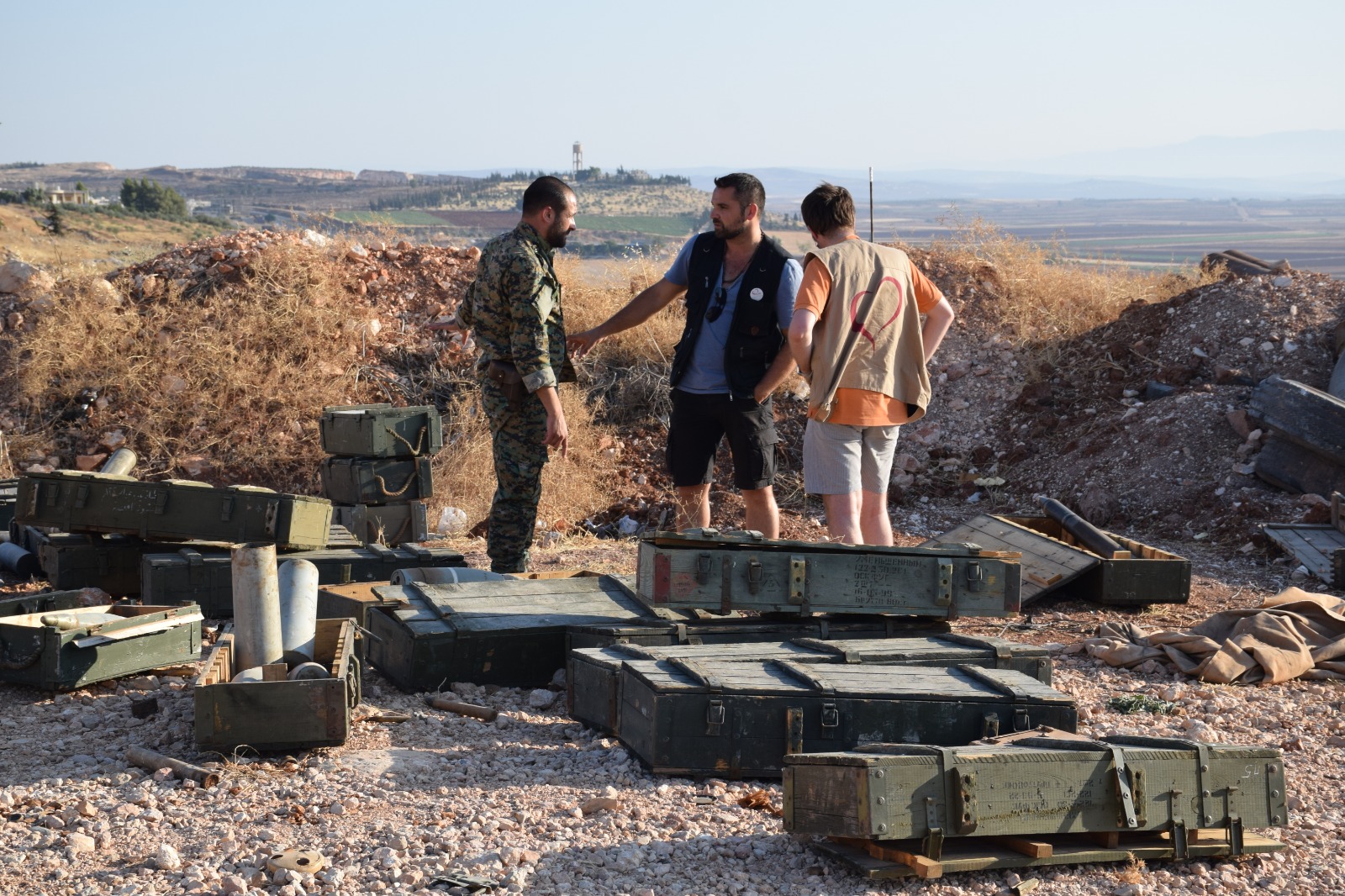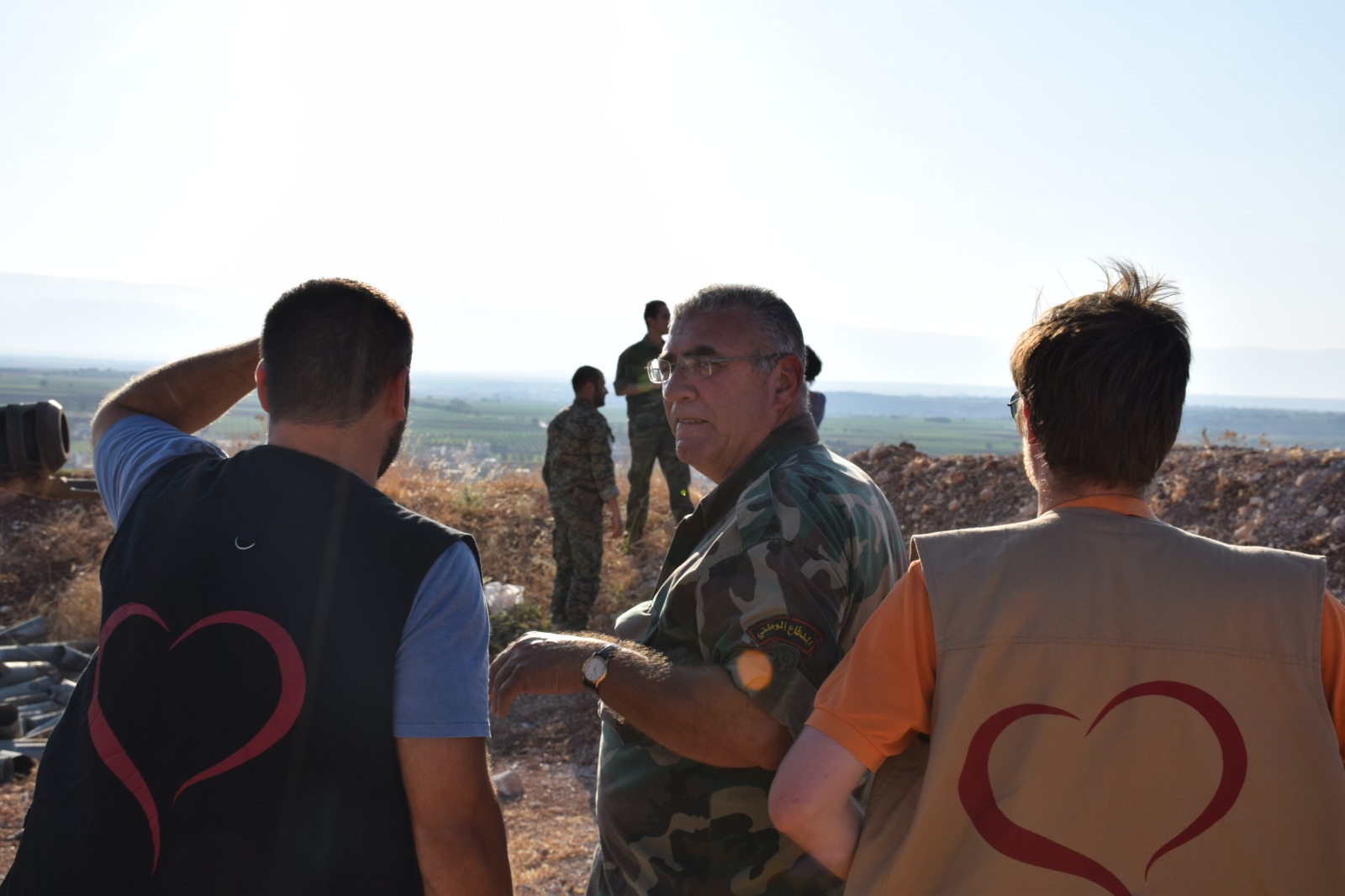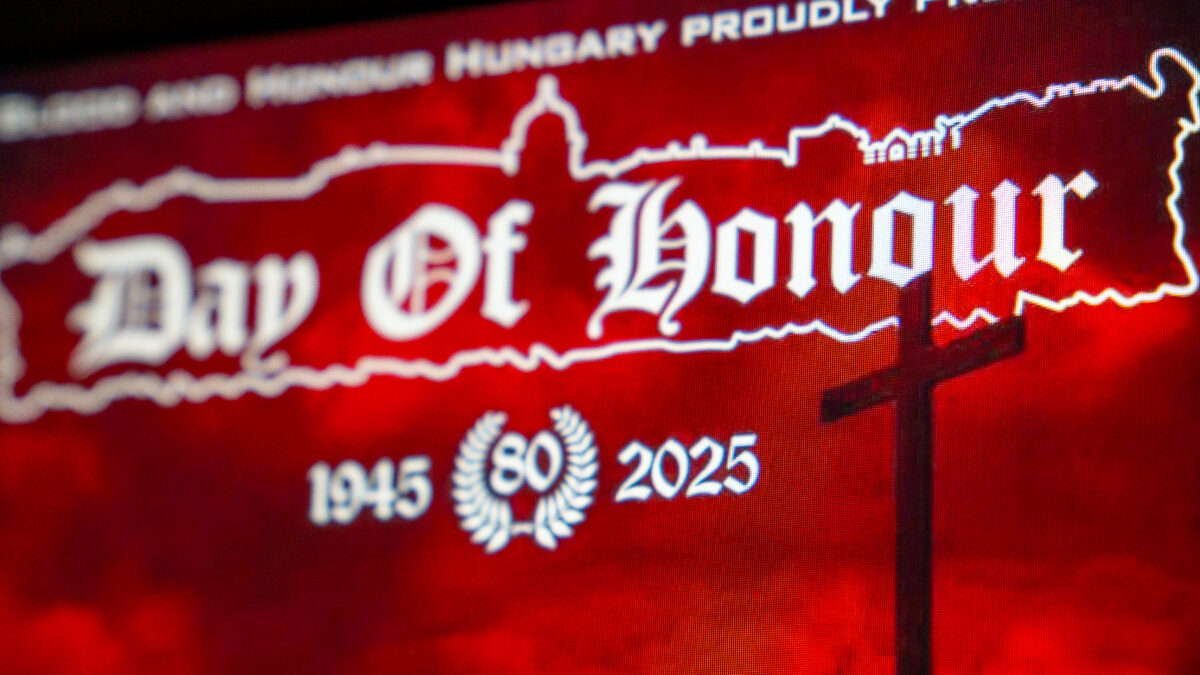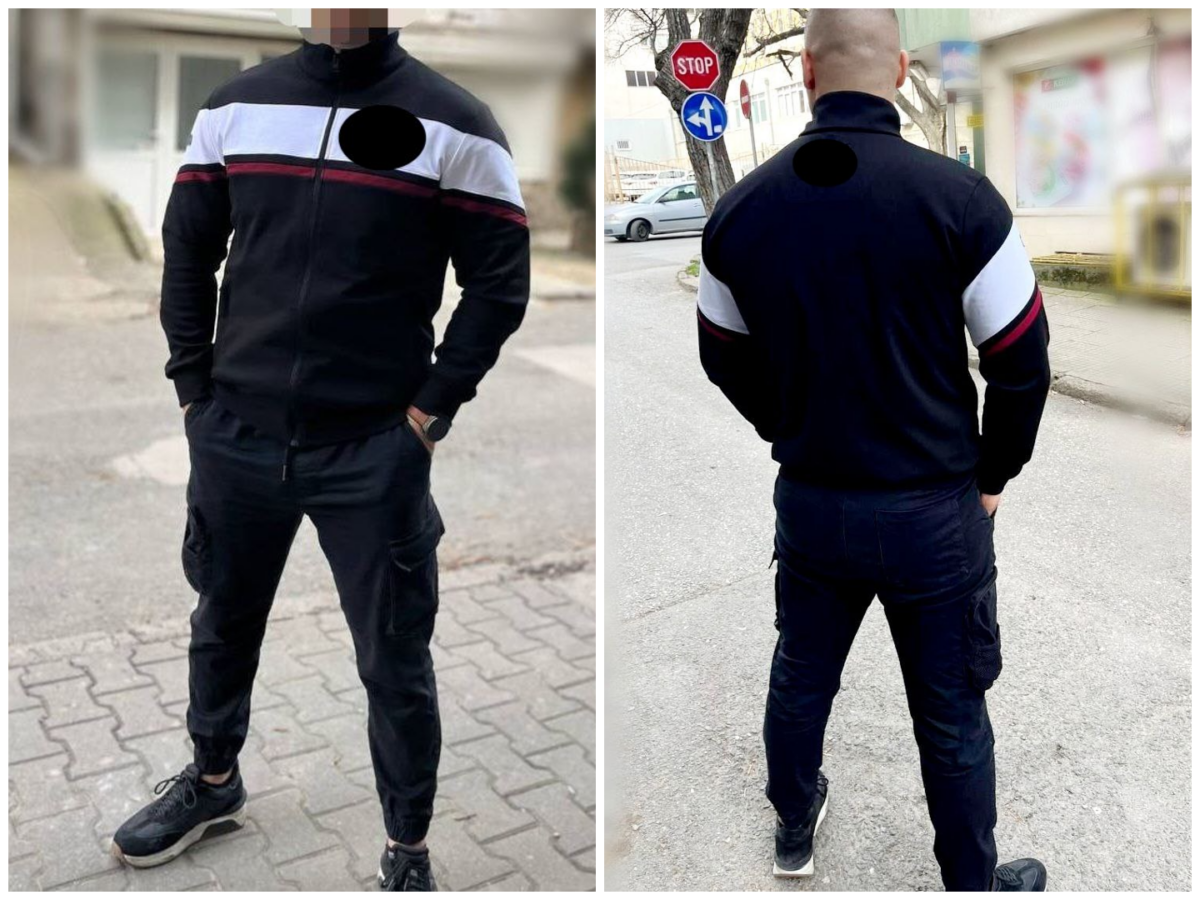How a French Charity Built Ties with Pro-Assad Christian Militias
This story was produced with Mediapart. Read their original version of the investigation here.
In a video posted to Youtube in 2019, a group of men and women in matching white t-shirts dine alongside two neatly-dressed French nationals and a man in military fatigues. The Frenchmen then hand the man in camouflage a golden award, congratulating him on the liberation of the small Christian village of Maharda in regime-controlled Western Syria. Later in the video, another smiling soldier in a different Christian village 25km away, al-Suqaylabiyah, receives the same award. Bashar al-Assad, wearing sunglasses, looks down on the ceremony from a large photo on the wall behind.
The Frenchmen presenting the trophies are Benjamin Blanchard, director general of the French humanitarian NGO SOS Chrétiens d’Orient (SOSCO) and Alexandre Goodarzy, its then-head of mission in Syria.
The Syrian combatants receiving the awards are Simon al-Wakil and Nabil al-Abdallah, introduced by SOSCO as men who have “fought since the beginning of the conflict without ever giving up!” The NGO has frequently called for donations to support the inhabitants of the villages the men claim to protect.
But this investigation has found that Al-Wakil and al-Abdallah are in fact warlords leading pro-Assad militias accused of war crimes. As one researcher for Human Rights Watch believes, SOSCO’s support for them violates the humanitarian principles of neutrality and impartiality and could make the NGO complicit in war crimes.
An “Apolitical” NGO
Created in 2013, the French association SOS Chrétiens d’Orient (or SOS Christians of the Orient) describes itself as “an apolitical NGO” that works to support Christians across the Middle East, as well as in Ethiopia, Pakistan and Armenia. It has sent hundreds of young French volunteers to the region and facilitated meetings between French politicians and Syrian officials.
The NGO’s mission—one it sees not simply as a humanitarian endeavor, but as one of divine and cultural importance—is to renew the links between the Christians of the West and those of the “Orient”. In its own words, “the association testifies to the superior vocation of France.”
The founders, French far-right activists Charles de Meyer and Benjamin Blanchard, met in police custody after being arrested at a protest against same sex marriage in Paris in 2013.
Alexandre Goodarzy was head of mission in Syria until early 2020, when he disappeared for 66 days in Iraq with three other SOSCO workers in undisclosed circumstances.
The founders say that they created SOSCO as a reaction to a battle in Maaloula, a small Christian village north of Damascus attacked by rebels and Jabhat al-Nusra in 2013. Pro-Assad figures frequently use the event to argue that the regime protects minorities against the threat of Islamist terrorism.
SOSCO now has several permanent offices across regime-held territories in Syria and collects around €7 million in donations every year, according to annual financial accounts reviewed by Mediapart.
SOSCO presents the town of Maharda and the nearby town of al-Suqaylabiya as a “symbol of Syrian resistance to international terrorism” and a modern incarnation of Joan of Arc, “who followed the Lord’s call to fight for her land.”
The NGO volunteers frequently visit Maharda. Last Christmas, for example, they wrapped presents at the home of militia leader Simon al-Wakil.
And when Alexandre Goodarzy married a former SOSCO volunteer, Fimy Hanna, in Maaloula in 2018, Nabel al-Abdullah, Simon al-Wakil’s son Fahed—who also fights in his father’s militia—and Salem al-Barni, another soldier of the NDF [National Defense Forces, a pro-regime militia] in Maharda, attended the ceremony, as shown in photos posted on Instagram by Fahed al-Wakil.

Alexandre Goodarzy and Benjamin Blanchard reviewing NDF artillery positions and ammunition on the Maharda frontline in 2016. Photo courtesy of Mediapart
SOSCO’s Breach of Humanitarian Principles in Maharda
The plight of Maharda features heavily on SOSCO’s website and in fundraising drives. In 2019 alone, the NGO raised at least €35,600 for the village. €15,600 came via a Christian crowdfunding platform, while €20,000 was raised at an auction organized with Marc-Etienne Lansade, the far-right mayor of the southern French commune Cogolin, and the far-right French columnist Eric Zemmour. In a 2019 interview with pro-Kremlin media outlet Sputnik, Alexandre Goodarzy said SOSCO had “raised 50,000 euros [for Maharda], we have spent about 10,000 euros for the moment.” In answers published online, the French association told us: “to this day, we have spent around 80,000 euros on the towns of Maharda and Suqaylabiyah.” The NGO provided no documents to back up its claim and did not explain how the money was spent.
SOSCO gives little information about how it uses the money on the ground in Maharda, but in Goodarzy’s Sputnik interview he says they give food “particularly to families whose spouses go to battle.”
On the crowdfunding page, SOSCO asks for money for the “deeply grieving families of martyrs” for food, clothing, medical supplies and materials to help with reconstruction.
A 2019 article published on SOSCO’s website reads: “we can’t deliver medicine but we bring Mr. Simon [al-Wakil] and his men the things they need to get through the day: coffee, tea, matee (sic) and tobacco.”
According to a 2018 story published by the news site al-Modon about Maharda, “a delegation from the organisation SOS Chrétiens d’Orient […] went to the area and gave the head of the militia varying equipment and assistance”
“If it turns out that the money collected is given to the head of the militia, and that it is the militia which distributes this money to the families and benefits from it in abuses, then SOS Chrétiens d’Orient could be accused of complicity in the crimes committed by these militias,” Sara Kayyali, Syria researcher at Human Rights Watch (HRW), told Mediapart.
In one of the numerous YouTube videos about Maharda posted by SOSCO in 2016, Alexandre Goodarzy and Benjamin Blanchard, along with other volunteers, can be seen distributing supplies with the help of men in camouflage. “We are here with food and covers for the National Defense of Mhardeh [Maharda] who have been under attack from al-Nusra for the past couple of weeks,” says Goodarzy.
It is unclear which of these supplies were given to local civilians. Salem al-Barni, who was present at Goodarzy’s wedding, features in the video. He wears civilian clothing but is described as an NDF lieutenant.
This blurring of lines between humanitarian operations and support to fighters within militias seems to be a pattern of SOSCO activities in Maharda. Al-Wakil himself was present for a similar SOSCO operation in February 2019.
SOSCO appears to breach the EU’s humanitarian principles of neutrality and impartiality by distributing aid in this way, raising money for the families of dead NDF fighters and siding with pro-Assad forces. This violates EU stipulations that “humanitarian aid must be provided solely on the basis of need” and “must not favour any side in an armed conflict” This seems of little concern to the association, who told us: “We never claimed to be neutral against al-Qaeda”.
NDF in Maharda and al-Suqaylabiyah
The NDF is “by far the largest militia network in Syria,” according to analyst Aron Lund. It “was created through the rebranding, restructuring, and merging of local Popular Committees and other pro-Assad armed groups starting in 2012.”
As noted by the Syrian opposition NGO Pro-Justice, loyalist militias are known to have been financed by Al-Bustan, the so-called charitable organisation of Rami Makhlouf, Bashar al-Assad’s cousin, who is currently under European sanctions. The Guardian revealed in 2016 that UNICEF had paid al-Bustan more than $260,000.
In October 2018, the NDF in al-Suqaylabiyah thanked a representative of the al-Bustan charity, Dr. Yahya Youssef, for offering medical support to the local militia fighters.
According to Reuters, NDF combattants were trained and equipped by Iran, a longstanding Assad ally, in 2013, to shore up the government’s depleted armed forces.
In his interview with Sputnik about Maharda, SOSCO’s Goodarzy said, “the Iranians take a few men and train them in Iran on weapons handling, rocket making, etc.”
“It is unfortunate to see that it is the Shiite Islamic Republic of Iran that defends the Christian minorities in the Levant,” he added. “It should be the work of France.”
The strongly pro-Assad British blogger Vanessa Beeley—who has also visited and praised Maharda and al-Suqaylabiya—claimed on Twitter in early 2020 that Qassem Soleimani, the former-Islamic Revolutionary Guard Corps general, helped train the NDF in northern Hama, posting a picture of al-Wakil and Soleimani.
It appears the NDF shifted from Iranian support to Russian patronage after their military intervention in Syria on the regime side in 2015. Militia leaders often vie for Russia’s favour.
Nabel al-Abdullah and Simon al-Wakil appear to be close to Russian officials.
Al-Abdallah went to Moscow in 2019. He met with Russian special forces and represented al-Suqaylabiyah, Maharda and other villages in the area at the Fifth World Christian Congress in Russia.
In 2018, the NDF commander received a watch “from the President of Russia” engraved with official presidential insignia.
And the two NDF commanders have been commended several times by ranking Russian officials.
Al-Wakil and al-Abdullah have also praised—and appeared in photos with—the notorious Brigadier General Suheil al-Hassan, commander of the pro-regime Tiger forces, who likely oversaw a chemical attack on al-Lataminah in March 2017 as rebel forces tried and failed to push through Hama, according to a previous Bellingcat investigation. The Tiger forces are also linked to other chlorine attacks carried out by helicopters.
The NDF took part in the same counter-offensive in Hama. Maharda is just 10km south of al-Lataminah.
Despite the overwhelming evidence, SOSCO’s Goodarzy has dismissed the regime’s responsibility for the chemical attacks—including the one in nearby Khan Sheikhoun—as “lies.”
Both Nabel al-Abdullah and Simon al-Wakil also coordinate with fighters from the neo-fascist Syrian Social Nationalist Party.

Alexandre Goodarzy, Simon al-Wakil and Benjamin Blanchard look out from the Mahardah frontline in 2016. Photo courtesy of Mediapart
Accusations of War Crimes
SOSCO describes the two militias as self-defense forces, despite both al-Wakil and al-Abdallah’s troops appearing to have fought outside of their hometowns. “We have had the honour of participating with the Syrian army in waging war against terrorism in Hama, Idlib, Khanaser and Aleppo,” said al-Wakil in 2019.
Following the regime’s scorched-earth policy on rebel-held areas, the NDF have stolen goods and furniture from peoples’ homes, according to Reuters. The 2019 offensive in Hama/Idlib province was no exception. Loyalist forces that included the NDF reportedly looted houses after seizing villages, selling their haul in a market in al-Suqaylabiyah, according to Syrian Network for Human Rights. This has become a hallmark of NDF activities, ensuring people do not return to their homes. The act has become so common-place that Syrians have invented a word, ta’afeesh, to describe it.
Simon al-Wakil and Nabel al-Abdullah have also been personally accused of war crimes. According to the Blacklist, published by opposition NGO Pro-Justice, Simon al-Wakil was responsible for “the Halafiyya [Halfaya] massacre, on 16 December 2012, which resulted in the deaths of 25 people when civilian houses were targeted with heavy shelling from artillery.” The town of Halfaya, just 1 km from Maharda, was then in rebel-held territory and was a target for the Syrian Air Force.
Pro-Justice has also accused both Simon al-Wakil and Nabil al-Abdullah, along with other militia commanders, of committing or supporting at least seven war crimes in the Hama region, including the killing of hundreds of men and women.
In only one day, in the village of al-Qubayr, they allege that “militia members killed 100 women and children, ten of whom were slaughtered with knives, and their bodies burned.” While in al-Traymsah [Tremseh], also close to Maharda, “militia members killed 220 civilians.”
Opposition activists released an audio recording attributed to Nabel al-Abdullah in 2017 in which he calls on what seem to be his foot soldiers to burn down rebel controlled-local villages after seizing them.
He has also been spotted with the infamous IRAMs rockets (Improvised Rocket Assisted Munitions), a signature of Iran-backed militias in Iraq and Syria that are known for their destructive power and inaccuracy—and for causing massive civilian casualties.
The use of these munitions by the NDF has already been documented by the Brown Moses blog of Bellingcat founder Eliot Higgins. IRAMs were involved in chlorine attacks during the Syrian conflict, as documented by Bellingcat.
Defenders of Christians or Assad apologists?
Meanwhile, SOSCO sticks doggedly to the regime’s narrative. The NGO casts Assad as the protector of minorities and militias like those of Al-Wakil and Al-Abdallah as their champions on the ground.
The NGO’s own videos further contradict its apolitical stance. Former Syria head of mission, Alexandre Goodarzy, speaks to camera from an NDF artillery position in a March 2019 video just as al-Wakil’s militiamen are firing. “The terrorists have just bombed,” he says. “The reply was immediate. The National Defense, with Mr Simon, gave the order to fire, and off flew four Grad missiles.”
Based on the description of the location given by Goodarzy himself (next to Shaizar village and the Shaizar castle), we were able to geolocate the firing position to a spot in the north-east of Maharda, on top of a hill, approximately here.
Rebel and loyalist forces were firing at each other at the time the video was shot, according to several reports of strikes hitting Maharda and residential areas of al-Lataminah, which was then under rebel control.
But SOSCO appears to have picked its side. “We deplore… that these journalists devote their energy to harming a charity, whose work is recognized and praised in the field,” the SOSCO press officer told us, “instead of, for example, investigating terrorist movements that threaten innocent people.”
In one eight-minute speech, Goodarzy draws parallels between acts of terrorism in France and the Syrian opposition, calling on SOSCO’s donors not merely to make donations, but to actively, emotionally and spiritually take sides in what his organisation deems a divine battle.
“At some point you have to be coherent, to stop lying to yourself and stop being idiotic,” he tells viewers. “We really need you, we don’t just need your donations… we also need your intelligence. You have to open your eyes.”
SOSCO’s preemptive strike
After receiving a 41-question list from Mediapart , SOSCO sent a long email to their subscribers (shared here on Facebook) on September 7, in which they denied having any knowledge of the war crimes allegations against Simon al-Wakil and Nabel al-Abdullah. This despite the fact that the NGO posted an interview with the NDF Mahardah leader on their website last February in which he showed them, “amused”, accusations in the “pro-jihadist media” of “so-called massacres”.
In its newsletter, the French NGO warned its subscribers of the forthcoming investigation and invited them to “stay vigilant and ready even to help [SOSCO] if necessary”.
Their campaign was quickly supported by far-right French websites Breizh Info and medias-presse.info. SOSCO’s official statement, sent the day after, September 8, in French, can be viewed on the association’s website.
Regarding the specific accusations against him, the former head of mission in Syria Alexandre Goodarzy replied, on September 8: “I know that you do not respect any ethical rules and that everyone must be available to you, but there are still laws in our country. I am an employee of SOS Chrétiens d’Orient and I do not understand why you are asking me questions about my employer.”
The authors would like to thank Historicoblog for his help cataloguing the activities of the NDF in al-Suqaylabiyah.
This investigation was supported by Money Trail and European Cross-Border Grants, programs of Journalismfund.eu, a non-profit organisation facilitating independent cross-border investigative journalism in Europe by connecting donors and journalists.




